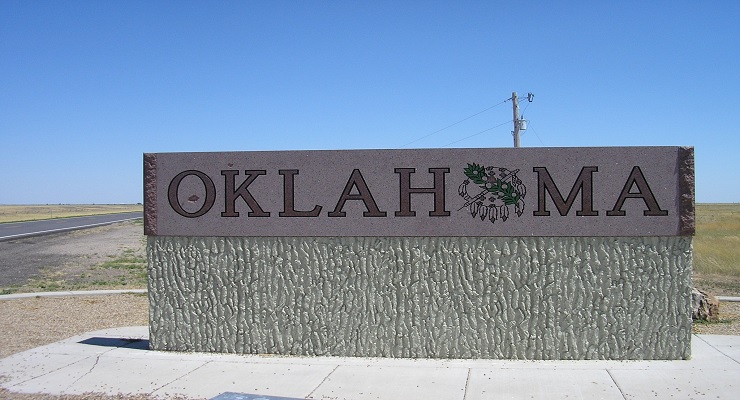
From Voice Of America
One night in August 1999, Patrick Dwayne Murphy, a member of the Muscogee (Creek) Nation (MCN), stabbed and mutilated a fellow tribe member on a lonely stretch of road on the MCN reservation in Oklahoma, leaving him to die. Murphy was tried in a state court and sentenced to death in 2000.
Since then, he has filed a series of appeals on grounds that because he committed the crime on an Indian reservation and the victim was also Native American, the state had no right to try him; by law, the federal government has jurisdiction over murders committed by Native Americans on lands in “Indian Country”—that is, lands inside federally-recognized reservation borders, dependent Indian communities or lands historically allotted to tribe members which their heirs still hold.
Eventually, the case landed in a federal appeals court, where after a review of historic documents and legal precedent, judges in August 2017 overturned Murphy’s conviction.
This meant that Murphy was eligible for a new trial in federal court, with the tribal court sharing jurisdiction. And in federal court, he would likely escape execution: Federal law gives tribes authority to decide whether the death penalty should be imposed for crimes committed under their jurisdiction. MCN, as have all but one tribe in the U.S., rejected the death penalty.
Sticking point
But that wasn’t the end of the case. As it turns out, there is far more at stake than whether a Murphy lives or dies.
The MCN reservation spans nearly two million hectares and 11 Oklahoma counties with a combined population of about 950,000. Recognizing MCN’s criminal jurisdiction meant that all this land was legally “Indian Country.” And that, in turn, meant that MCN had civil and criminal jurisdiction over nearly half the state of Oklahoma.
Oklahoma has taken the case to the Supreme Court, arguing that MCN, established by an 1866 treaty, stopped existing in 1907 when Congress created the state.
“If not corrected, the decision … could result in the largest abrogation of state sovereignty by a federal court in American history,” Oklahoma attorney general Mike Hunter warned in his petition to justices.
There is, however, a problem with Oklahoma’s argument: The law says only Congress has the power to diminish or disestablish reservations and it must do so in clear and “unequivocal” language. And as it turns out, as the federal court found, Congress never officially disestablished the MCN reservation.
Now it’s up to the Supreme Court to decide.
Economic, legal implications
In oral arguments before justices November 27, Oklahoma’s attorneys outlined “seismic” results if the federal ruling stands: Tribe members would be exempt from paying state taxes and could impose taxes on non-Native business owners, who also could be subject to MCN’s land-use and environmental laws.
Oklahoma also worries that hundreds of jailed Native Americans would have to be retried in federal courts, tying up the state’s legal system.
Oklahoma is one of the nation’s biggest oil and gas producers, and the industry is especially nervous about the case. The Oklahoma Independent Petroleum Association (OIPA) filed a friend of the court briefing, explaining those concerns.
“The economic impact of transforming regulation in Oklahoma would be severe, especially in the oil and natural gas industry,” said OIPA vice president Cody Bannister in an emailed statement. “An oil or natural gas producer operating in what was previously open land would now be faced with a tribe’s claim that those wells lie in tribal lands and any rights the producer holds to the land or production of the oil and natural gas are invalid.”
Considering consequences
But Robert Miller, professor at Arizona State University’s Sandra Day O’Connor College of Law and a member of the Eastern Shawnee tribe in Oklahoma, says these concerns are overblown.
“The struggle between governments is over money and power, and power means jurisdiction,” he said. “Oklahoma can still control its non-Native citizens. It just doesn’t want to lose environmental control or civil and criminal jurisdiction over the Indians.”
During oral arguments, justices questioned the state’s attorneys about their concerns and what the ramifications of allowing the previous decision to stand.
“Yes, there will be turmoil,” said Miller. But he believes the Supreme Court should not consider real life consequences.
“The Court is supposed to decide the case based only on the law,” he said, citing the landmark 1954 Brown v. Board of Education of Topeka Supreme Court decision which ended racial segregation in public schools. That verdict set off waves of riots, violence and even murders in the U.S. South—and resistance that went on for years.
“Should the Supreme Court, then, knowing what would happen, not have rendered that ruling?” Miller asked.
But, as lawyers have noted, justices frequently do consider the effects of their judgements, especially in cases like this one, where existing laws are fuzzy.
Leave a Reply